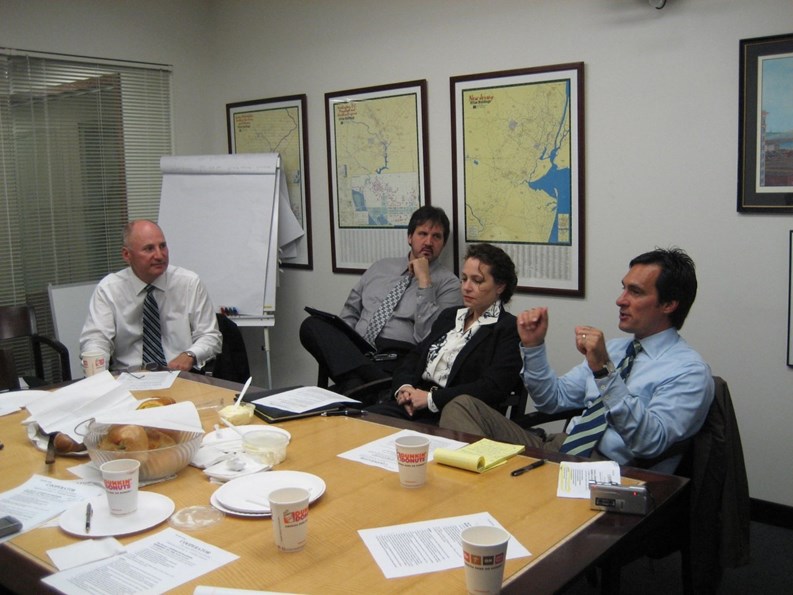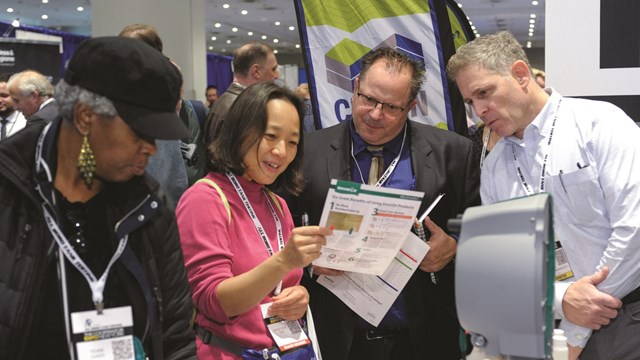A group of Garden State legal and management professionals gathered in The New Jersey Cooperator’soffices in Midtown Manhattan for a casual breakfast and some informal conversation about the rewards and challenges of their work in the condo and HOA industry at the first-ever New Jersey roundtable forum.
Attendees included Michael and Susan Cervelli of Cervelli Management in North Bergen, Paul DePetro and Robin Habacht of Monticello Management in Matawan, Rumson-based HOA attorney Thomas Vincent Giaimo, John Kwasnik of Metuchen-based law firm Mezzacca & Kwasnik, Ronald L. Perl of Hill Wallack LLP in Princeton, and Elaine Warga-Murray of The Regency Management Group LLC in Howell.
Discussion at the forum ranged from horror stories of irrational board members and association residents to more mundane issues like managers’ workloads. Two key themes emerged over the course of the morning’s discussion, however: the extent of associations’ responsibility when it comes to looking after and advocating on behalf of elderly or disabled HOA residents, and the skills and characteristics that make for an outstanding association manager or legal representative.
Who’s Role is It?
As the Baby Boomer generation ages, questions about care and day-to-day support for less able senior association members are becoming more urgent all the time.
“How about the resident with Alzheimer’s Disease who doesn’t have any relatives nearby or anybody taking care of him?” Habacht began. “We’re not trained to handle that. If we have work to do, it’s to interface with agencies that will be supportive of us when we need it. Managers may not think the lady with Alzheimer’s in a co-op or condo is their normal clientele, but they have to be educated, because that person needs social services and associations are not social service agencies.”
“We had fire in a unit because at nine o’clock one night, an 87-year-old resident was baking a pie and left her oven mitt in the oven with the pie,” said Warga-Murray. “Again, it was a person who was not necessarily aware, and not [being] helped. And that’s one of the things that we’re concerned with that has to be addressed. How do you help people who are not able to live in a responsible way?”
“In one of the apartments we manage, we had a woman who was mentally unstable, and let her apartment go to the point that it was reeking—a horrible smell,” added Susan Cervelli. “She had no relatives, so the board called the board of health, who had the police come down to work with her. She paid for cleaning up her unit, but we as the association were almost the guardians taking care of this woman. Now the board and the woman are working together on a monthly basis to make sure that…her house is somewhat sanitary, and make sure there are no more odors. So that was a success story.”
Sometimes it’s not just the elderly and infirm who need help in a association community—malicious neighbors are not unheard of, and can spread problems throughout even the most placid HOA.
“I remember a board member having hot oil poured all over her car,” one panelist said to another, “and I remember you drafted a resolution where the board reimbursed her for the paint job.”
“You have people that are not well out there,” agreed Kwasnik, “but we have to deal with them because our type of housing is just so popular these days and getting more and more so. We can’t be everything to everybody—although sometimes our residents want us to be. We really need to enlist the aid of social service agencies that have mental health professionals and police officers and people that know what to do.”
“I don’t know that managers are going to have to be able to provide social assistance,” added Michael Cervelli. “I think there has to be much more cooperation between the social environment outside the community and the health department and social services for managers.”
Mindset Makes the Manager
The conversation around the table then moved on to the age-old question: What set of character and personality traits makes for the best property manager, or HOA’s legal counsel?
“The best trait is to listen,” said Habacht. “The ability to listen, and to hear. One of the things we train our managers is that the first thing you say to someone [who comes to you] is ‘Thank you, and I understand.’ It’s about being able not to just hear, but to listen to what is being said.”
“Property managers used to make sure that the lawn got cut and things got weeded,” added Perl, “but nowadays it’s about building community—and you build community by serving the owners. I believe that the number-one trait for an association attorney is being a problem solver… Association lawyers need to be problem solvers and help the managers solve the practical problems. You’re dealing with people and trying to get everybody to coexist in the same space—that’s what this is about. A litigator is not going to be successful at making it work. All that person is going to do is spend a lot of their client’s money litigating, and solving nothing. Problem solving means understanding the dynamics of the association, understanding how people work, and what they need to be happy.”
“ I think there has to be a focus on more than one right answer to a question or problem,” said Susan Cervelli.
“And what are the options available,” added Warga-Murray. “To constantly refer to restrictions instead of offering options is the biggest mistake a manager can make. That’s one of the issues we’ve been focusing on from a community management point.”
“Elaine mentions providing options, and I agree with that,” interjected Perl. “I would also say that creating an environment where people have choices, is vital, and that the people running the associations should actually be interested in what the owners need in order to be happy. That’s a whole different skill set than the earlier property managers had when they were just worried about the color of the storm doors, or thinking about weeds in the flowerbeds. Creating a community, creating an atmosphere, giving people options—that’s what it’s about today, and will be into the future if this is going to survive this housing market.”
According to Michael Cervelli, the hallmark of a solid property manager “is professionalism, it’s listening, it’s patience, it’s having thick skin and not taking anything personally. It’s a challenge. It’s all of these things. It’s no longer ‘The roof is leaking— just go fix it.’ You’re dealing with personalities and individuals—it becomes complicated. Maybe you have to become a therapist as well.”
The best managers, claimed Habacht, are all that and more. They have to listen, problem-solve, and play the role of psychologist when the need arises. She went on to say that she agreed wholeheartedly with Warga-Murray about the importance of offering options to both clients and management associates that would allow them some creative latitude in problem-solving.
“We started doing something interesting with our residents,” Habacht continued. “Most residents feel that their property management company works for the board. We took a new approach when a resident would call our office, where I’ll say to the owner, ‘Can you give me permission to act as your advocate? If you give me permission I would like to represent you to the board. I would like to argue your case with the board.’ And it changes everything. You feel the homeowner’s whole attitude change, and suddenly we’re not the enemy, we work for them. ‘Whatever your argument is, I will take it to the board.’ As a property manager, it’s very important to really like people and really want to help them.”
“We don’t live in our client HOAs,” said Warga-Murray, “but we care for those properties as if they’re our own. So as a manager, if you have that compassion and that empathy, it’s teamwork. And you need to work as a team. The home office has to provide options to the front line for dealing with the residents directly. That’s how we answer the question, ‘How can we help you?’”
“Speaking from a legal perspective,” said Giaimo, “I think there are four really important traits: responsiveness, objectivity, honesty, and professionalism. Quite often when we find ourselves in committee or association meetings, dealing with unreasonableness, or with individuals who are not comporting themselves as they should be in a meeting setting. We deal with rudeness, we deal with irrationality. And I think it’s very important that the attorney or manager conducts him or herself with the utmost in professionalism despite that unreasonableness. Because to do so, you are lending respect and creditability to the board that you represent, as well as to all the other professionals employed by the community association.”
Susan Cervelli agreed, saying that “under any circumstance, the attorney and professionals have to stay focused.”
Perl suggested a tried-and-true method. “I’ve found that the nastier and more obnoxious an owner gets, the nicer you get—and it works every time.”
“Honesty and objectivity are so important,” Giaimo continued, “because truly good lawyers cannot always tell their client what they want to hear. So many times I see attorneys placate, knowing what the board would want to do—but in order to do your job for your board and your community, you have to be honest with them. Tell them the good and the bad. That’s a core trait necessary in representing an association.”
“I’ll take that one step further and say that you have to give the same advice to each and every board member,” added Perl. “Board members will try and lobby you to take their position against someone else’s, but we don’t represent individual members—we don’t even represent the board as a unit. We represent the association. If 10 different people call me, they’re going to get the exact same advice no matter who they are or what side of the given issue they’re on. As soon as you start telling them what they want to hear, you’re going down a slippery slope and your professionalism is gone.”
Tabled—Until Next Time
One constant throughout each and every roundtable forum The Cooperator has hosted over the years has been the feeling on the participants’ part that they only just scratched the surface of all the issues and ideas they could discuss with each other. Indeed, there were plenty of talking points on the morning’s informal agenda that the group never got to explore because there simply wasn’t enough time to delve into them.
Rest assured however, that the first New Jersey roundtable forum was definitely not the last. Just as we’ve assembled groups of New York-based professionals working in the co-op, condo, and HOA field over the years to discuss hot-button issues affecting them and their clients, we’ll do the same for the New Jersey market as well.
If you are a professional serving New Jersey’s HOA, condo or co-op community and would like to participate in the next New Jersey roundtable event, please contact Debbie Estock, managing editor, at 212-683-5700 x364, or e-mail her at debbie@cooperator.com.
Hannah Fons and Brendan J. Flaherty are associate editorsof The New Jersey Cooperator.





Leave a Comment